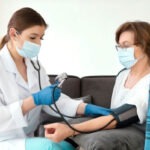Preventive Gynaecological Examination
Women should undergo this examination starting at 15 years of age. The goal is to recognize potential harmful changes as soon as possible.
A patient undergoing this preventive examination must deliver her personal and family information. The examination itself is executed with sight, touch and mirrors (and personalized depending on age and health of patient) and the gynecologist then declares results or further steps that need to be taken. If necessary, the gynecologist takes samples for microbiological or cytological examination. He also examines breasts, helps with self-examination training and recommends a regular two-year mamographic examination to women between 45 and 69 years of age.
Instruction of proper hygiene routines is also included; special care will be arranged if needed. Also in this type of examination, the process is focused on ruling out problems that require oncological care or other specialized examinations or treatment.
If a gynecologist diagnoses conditions that could indicate a disease, or which need to be checked by other physicians, he will notify the patient.
A medical examination schedule is recommended as under:
Physicals every one to two years for people ages 30 to 50 and every year thereafter,
Regular cholesterol tests,
Colon exams every year for people over age 40,
Screenings for cervical cancer every one to two years for women over age 30.
Concrete conclusions are drawn from each preventive medical examination. If the doctor discovers something, he will arrange for the provision of specialized medical care. It is clear that preventive medical examinations serve for the discovery of the most dangerous conditions that are subjects of health programs related to heart and coronary diseases, tumors, diabetes and conditions that require
special care and rare diseases.
All of this testing is designed to catch health problems before they have a chance to manifest as harmful diseases. And according to conventional wisdom, preventive medical care reduces costs and prolongs lives.
You might think that yearly medical check-up is just a routine part of staying healthy. Regular screening may be helpful in early detection leading to complete cure / better management of most diseases especially cancer, diabetes, heart disease etc.







Facebook Comments